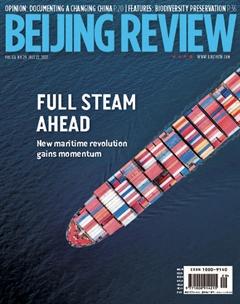Sailing Into New Waters
July 11 marks the 17th Maritime Day of China. On this very day some 600 years ago, Zheng He, a great navigator from the Ming Dynasty (1368-1644), kicked off his first voyage into the vast open waters. In total, Zheng undertook seven expeditions on behalf of the Chinese emperor sailing across the South China Sea, Indian Ocean, Arabian Sea, Red Sea, and along the east coast of Africa, leaving behind a wide range of cultural, religious and economic heritage.
China has been a maritime power, active and strong in oceanic freight shipping and shipbuilding. At a time of globalization, 95 percent of Chinas foreign trade in goods is transported by sea, while its shipping fleets keep growing. By the end of 2020, Chinas shipping transport capacity had hit 310 million tons of deadweight, ranking second in the world. That same year, Chinas imports and exports by sea amounted to 3.46 billion tons, accounting for 30 percent of global seaborne trade, with huge amounts of COVID-19-related materials shipped to countries around the world.
China has also proposed to foster a new development paradigm with domestic circulation as the mainstay and domestic and international circulations reinforcing one another. Ocean transportation plays a big role in connecting domestic and international markets.
Moreover, China boasts one of the largest port scales in the world, with eight of its seaports ranking among the worlds top 10 in terms of cargo throughput and seven listed among the global top 10 in terms of container throughput. All these elements combined suffice to prove Chinas relevance in international shipping, as well as the significance of Maritime Day for Chinas shipping industry.
This years China Maritime Forum, which took place in Kunming, Yunnan Province, offered a platform for communication and cooperation among those who are engaged in ocean shipping from home and abroad.
Currently, international shipping faces a variety of challenges brought on by the COVID-19 pandemic, climate change and ocean pollution. To overcome these diverse difficulties and forge a better future for this business, it requires joint efforts from the international community in the spirit of winwin cooperation, open-mindedness, inclusiveness and entrepreneurship. BR

